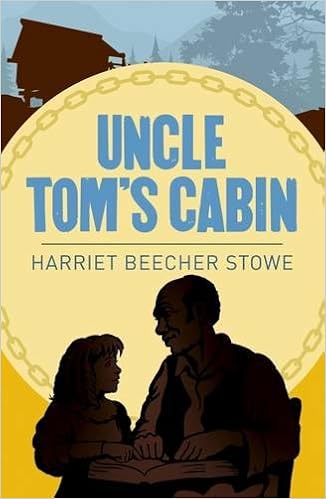
Harriet Beecher Stowe’s Uncle Tom’s Cabin follows the journeys of two slaves, one of whom, Eliza, flees northwards with her child while the other, Tom, is sold downriver to work on a cotton plantation. Stowe's novel sparked widespread support for the abolitionist movement, selling more than 300,000 copies in the first year. At the same time, the novel’s controversy increased tensions between the northern and southern states, leading Lincoln to describe Stowe as “…the little lady who made this big war.” Throughout the novel, Stowe appeals to the reader’s reason, humanity, and religious faith in order to spread awareness of the injustice and cruelty of the slave trade. However, her most compelling technique is that her characters are relatable to so many different segments of society, ranging from slave owners to Northerners.
While the book certainly makes clear the brutality of slavery, Stowe’s novel stands out because many of the slave owners are portrayed as showing kindness toward their slaves. By humanizing instead of demonizing the slaveholders, Stowe allows a much broader audience to relate to her book, rather than alienating them immediately. For instance, Mrs. Shelby, the wife of Tom and Eliza’s first master, sought to make slavery beneficial for her slaves: “I thought, by kindness, and care, and instruction, I could make the condition of mine better than freedom—fool that I was!” While uneasy about the morality of slavery, she still hopes to make the best of the situation. However, when financial difficulties force the Shelby’s to sell Eliza and Tom to a trader, she realizes that slavery is too deeply rooted of a problem to gloss over with kindness. As Mrs. Shelby describes, “This is God’s curse on slavery…a curse to the master and a curse to the slave.” No matter how kind the slave owner, the day will come when they can no longer protect their slaves from the darker side of slavery, as shown by the Shelby’s plight and again when Tom is sold away from the plantation of his second owner, St. Clare.
However, Stowe’s criticism is not limited to Southern slave owners. One of her characters, Senator Bird, is a northerner who supports the Fugitive Slave Act in congress. However, Stowe forces him to confront the implications of his words when the runaway slave Eliza appears on his doorstep with her child, desperate for help. As his wife says, “you can talk all night, but you wouldn’t do it…turn away a poor, shivering, hungry creature from your door, because he was a runaway?” Rather than attacking the indifference of northerners towards slavery, Stowe appeals to the humanity of her readers and has faith that they too lack the heartlessness to turn away a fugitive in need. Likewise, Stowe introduces the character Miss Ophelia, a northern woman who decries the injustice of slavery and yet cannot bear to touch a slave due to her own inner prejudice. Like Bird, she too realizes that words are easy to say, but are hollow compared to actions. As St. Clare tells her, “…if we want to give sight to the blind, we must be willing to do as Christ did,–call them to us, and put our hands on them.” Speaking out against slavery is important, but so is seeing slaves as fellow people, not just a stain on society to be erased.
Through the characters in Uncle Tom’s Cabin, Stowe addresses many different perspectives on slavery, ranging from Mr. Wilson, who dislikes slavery but objects to runaway slaves on legal grounds, to St. Clare, who clearly sees the evil of slavery and yet does nothing to stop it. In every case however, Stowe forces her characters to reconsider their actions when confronted with the reality of slavery, and implicitly challenges her readers to do the same. While slavery in America has long been abolished, the self-denial of Stowe’s characters is still reflected in people’s attitudes towards modern issues such as discrimination, refugee crises, and climate change. In each case, there are people like Senator Bird who proclaim the need to compromise because they have never witnessed the reality of the situation first hand, or like St. Clare who understand the problem but believe there is nothing they can do about it. As modern political discourse grows increasingly polarized, it is important to look back at Uncle Tom’s Cabin and understand how empathy with those you hope to convince is far more compelling than direct criticism.
No comments:
Post a Comment